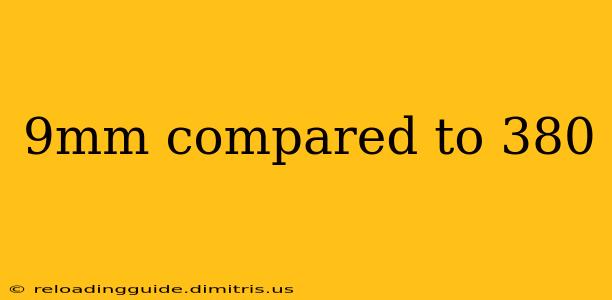Choosing the right caliber for your firearm is a crucial decision, impacting everything from self-defense effectiveness to target shooting accuracy. This in-depth comparison of 9mm and .380 ACP (9x17mm) cartridges will help you understand the key differences and determine which best suits your needs. We'll explore ballistics, recoil, capacity, cost, and more to provide a balanced perspective.
Ballistics: Power and Penetration
The most significant difference between 9mm and .380 ACP lies in their ballistic performance. 9mm boasts considerably more stopping power due to its larger diameter and heavier bullet weight. This translates to:
- Higher muzzle energy: 9mm cartridges generally possess significantly higher muzzle energy, meaning they deliver more force upon impact. This increased energy leads to greater penetration and a higher likelihood of incapacitating a threat.
- Greater penetration: While overpenetration is a concern with any round, 9mm typically penetrates deeper than .380 ACP, offering better performance through barriers like clothing or car doors. However, this also necessitates more careful consideration of your surroundings.
- Flatter trajectory: The higher velocity of 9mm results in a flatter trajectory, making it easier to accurately hit targets at longer ranges.
.380 ACP, while smaller, is still capable of self-defense. However, its lower muzzle energy and reduced penetration mean it's less effective against larger threats or in situations requiring penetration through obstacles.
Table: Ballistic Comparison (Approximate Values – Actual values vary by manufacturer and load)
| Caliber | Muzzle Energy (ft-lbs) | Muzzle Velocity (fps) | Bullet Weight (grains) |
|---|---|---|---|
| 9mm | 350-450 | 1100-1200 | 115-147 |
| .380 ACP | 150-200 | 850-1000 | 90-95 |
Recoil and Shootability
Recoil is another critical factor. The 9mm generally has more noticeable recoil than .380 ACP, making it potentially less comfortable for smaller or less experienced shooters. However, many modern 9mm handguns are designed to mitigate recoil effectively. .380 ACP's lighter recoil contributes to its popularity among those seeking a more manageable firearm.
Magazine Capacity
9mm handguns typically offer higher magazine capacities than .380 ACP pistols. This translates to more rounds available in a self-defense situation without needing a reload, a significant advantage.
Cost
Generally, 9mm ammunition is less expensive than .380 ACP ammunition. This difference can become substantial over time, particularly for regular practice or training.
Choosing the Right Caliber: Consider Your Needs
The "better" caliber depends entirely on your individual needs and circumstances.
- Self-defense: 9mm's superior stopping power and penetration make it a more effective choice for self-defense in most situations.
- Concealed carry: Both calibers are suitable for concealed carry, with .380 ACP often preferred for its smaller size and lighter recoil. The choice will depend on individual hand size, strength, and comfort level.
- Target shooting: Both calibers are viable for target practice, with 9mm offering more versatility and a wider range of ammunition choices.
- First-time firearm owners: .380 ACP's manageable recoil might be preferable for beginners.
Ultimately, the best way to decide is to handle both calibers and see which feels more comfortable and controllable. Consider taking a firearms safety course to learn proper handling and shooting techniques before making your decision. Consult with experienced shooters and professionals to weigh the pros and cons before making a purchase.

